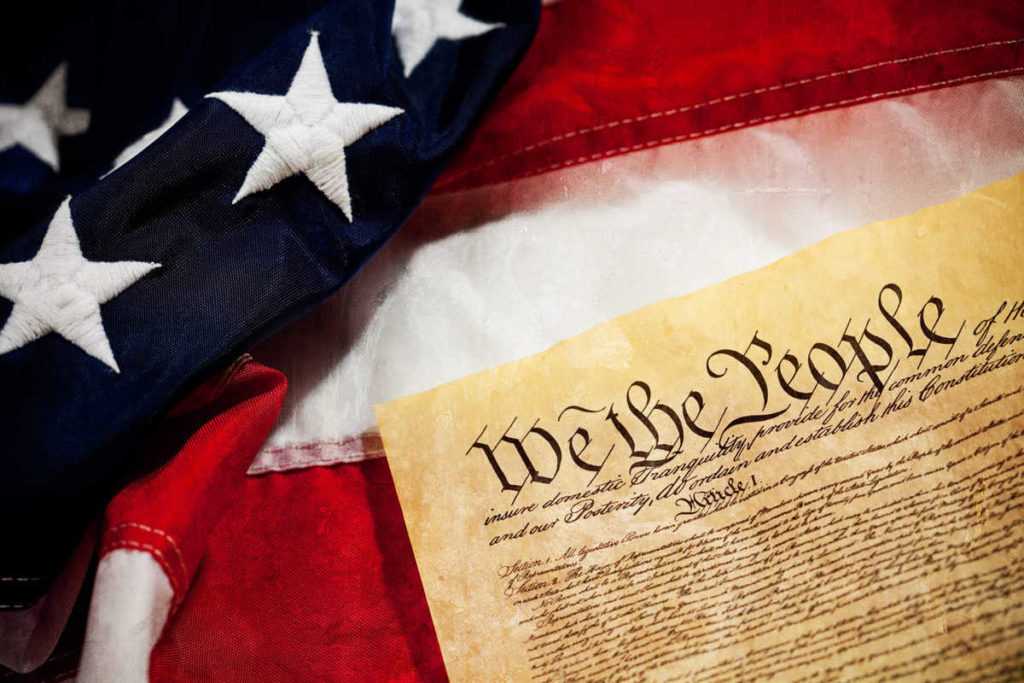An inconvenient fact — Our constitution has ‘domestic enemies’
In his June 2, 2020, article in The Atlantic, former Chairman of the Joint Staff Admiral Mike Mullen wrote, “Our fellow citizens are not the enemy, and must never become so.”

Series featuring "We the People" - the United States Constitution.
Originally published by Newsmax
In his June 2, 2020, article in The Atlantic, former Chairman of the Joint Staff Admiral Mike Mullen wrote, “Our fellow citizens are not the enemy, and must never become so.”
In the same article, Admiral Mullen wrote: “I remain confident in the professionalism of our men and women in uniform. They will serve with skill and with compassion. They will obey lawful orders. But I am less confident in the soundness of the orders they will be given by this commander in chief, and I am not convinced that the conditions on our streets, as bad as they are, have risen to the level that justifies a heavy reliance on military troops. Certainly, we have not crossed the threshold that would make it appropriate to invoke the provisions of the Insurrection Act.”
The inconvenient fact is that some of “our fellow citizens” have become enemies of our Constitution, not only during the American Civil War.
By statute, every “individual, except the President, elected or appointed to an office of honor or profit in the civil service or uniformed services, shall take the following oath: ‘I, AB, do solemnly swear (or affirm) that I will support and defend the Constitution of the United States against all enemies, foreign and domestic; . . . .'” 5 U.S.C. § 3331.
Likewise, the presidential oath is in Article I of the Constitution: “I do solemnly swear (or affirm) that I will faithfully execute the Office of President of the United States, and will to the best of my Ability, preserve, protect, and defend the Constitution of the United States.”
With all due respect to Admiral Mullen, neither he nor any other American leader should suggest universally that, “Our fellow citizens are not the enemy.” The inconvenient fact is that some of our fellow citizens, including but not limited to Antifa terrorists, engage in actions that are designedly antithetical to our Constitution. When they do, we need to acknowledge and treat them as domestic “enemies” of the Constitution — affording them, of course, the 5th Amendment guarantee of “due process of law” before they are “deprived of life, liberty, or property.”
The Insurrection Act of 1807 was enacted by Congress 16 years after ratification of the Bill of Rights, the first article of which protects, among other rights, the “right of the people peaceably to assemble, and to petition the Government for a redress of grievances.” This constitutional protection does not extend, of course, to violent assemblies, rioting, or looting.
The Insurrection Act is codified in Title 10 of U.S. Code, §§ 251-254. It provides that, “Whenever there is an insurrection in any State against its government, the President may, upon the request of its legislature or of its governor if the legislature cannot be convened, call into Federal service such of the militia of the other States, in the number requested by that State, and use such of the armed forces, as he considers necessary to suppress the insurrection.” 10 U.S.C. § 251.
The Insurrection Act provides further that, “Whenever the President considers that unlawful obstructions, combinations, or assemblages, or rebellion against the authority of the United States, make it impracticable to enforce the laws of the United States in any States by the ordinary course of judicial proceedings, he may call into Federal service such of the militia of any State, and use such of the armed forces, as he considers necessary to enforce those laws or to suppress the rebellion.” 10 U.S.C. § 252.
The Insurrection Act concludes, “Whenever the President considers it necessary to use the militia or the armed forces under this chapter, he shall, by proclamation, immediately order the insurgents to disperse and retire peaceably to their abodes within a limited time.” 10 U.S.C. § 254.
The congressional design of the Insurgency Act is that the president has the discretion to decide if and when to conclude that it is “necessary to use the militia or the armed forces under this chapter.” The congressional check on this discretion is that when the president reaches this conclusion, the Insurrection Act requires that the President “immediately order the insurgents to disperse and retire peaceably to their abodes within a limited time.”
Once again with all due respect to Admiral Mullen, as he publicly questions “the soundness of the orders [‘our men and women in uniform’] will be given by this commander in chief,” it is not his place as a former chairman of the joint staff, especially during a heated presidential election, to suggest publicly that, “Certainly, we have not crossed the threshold that would make it appropriate to invoke the provisions of the Insurrection Act.”
The point at which we have “crossed the [Insurgency Act] threshold” is a discretionary call that Congress long ago acknowledged belongs to the president.
Joseph E. Schmitz served as a foreign policy and national security adviser to Donald Trump during the 2016 presidential campaign. The opinions expressed in this article are his personal opinions. Schmitz served as Inspector General of the Department of Defense from 2002-2005 and is now Chief Legal Officer of Pacem Solutions International. He graduated with distinction from the U.S. Naval Academy, earned his J.D. degree from Stanford Law School, and is author of “The Inspector General Handbook: Fraud, Waste, Abuse, and Other Constitutional ‘Enemies, Foreign and Domestic.’” Read more reports from Joseph E. Schmitz — Click Here Now.
- ‘America’s Enduring Prayer’ — 19 Years Ago - September 14, 2020
- Trump rightfully takes ‘preserve, protect, and defend’ to heart - August 31, 2020
- 1775 declaration foreshadowed current need for unity - July 8, 2020
